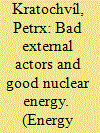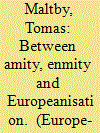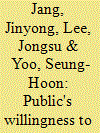| Srl | Item |
| 1 |
ID:
169864


|
|
|
|
|
| Summary/Abstract |
For Central and Eastern European countries, energy security has been one of the top political topics ever since the 2009 gas crisis. Although these countries have a shared interest in this issue, their preferences – especially those regarding the role of Russia as their main energy supplier – are not identical. This paper examines and juxtaposes the discourses on natural gas supply in the Czech Republic and Slovakia. Utilizing a broadly constructivist perspective, the article explores the media discourses connected to energy supplies in these countries. Methodologically, the paper employs critical discourse analysis to examine this discourse. The paper argues that the media discourses in both countries underline the overall unreliability of the external environment and stress the necessity to rely on domestic energy sources. In the Czech case, such an environment also includes the EU, which translates into a critical stance towards renewable energy, viewed as being forced on country by the EU. In contrast, the Slovak discourse presents the EU as a suitable arena for energy cooperation. Both countries agree on the support for nuclear energy, which is considered to be a domestic – and therefore most reliable – energy source.
|
|
|
|
|
|
|
|
|
|
|
|
|
|
|
|
| 2 |
ID:
139278


|
|
|
|
|
| Summary/Abstract |
Considering the development of the Bulgarian energy security strategy this article analyses how the country has adapted to EU membership and to energy security challenges, such as disruptions to Russian gas supplies in 2006 and 2009 and rising gas prices. Utilising a conceptual lens which synthesises Regional Security Complex Theory and Europeanisation, the article offers an explanation of energy policy changes. It concludes that conceptions of Russia as an energy security guarantor have changed since Bulgaria's EU accession and that Bulgarian energy policy has undergone a qualified reorientation away from a positive dependence on Russian energy sources, towards a convergence with EU priorities of diversification and a single energy market.
|
|
|
|
|
|
|
|
|
|
|
|
|
|
|
|
| 3 |
ID:
175891


|
|
|
|
|
| Summary/Abstract |
To strengthen the security of supply of the Serbian gas sector, it is necessary to analyze the impact of planned strategic measures. The analysis involves the identification of the most influential threats to the security of natural gas supply and prioritization of the strategic measures for overcoming the consequences of threats. The proposed methodology is based on Fuzzy Analytic Hierarchy Process. The obtained weights for the identified threats and strategic measures are formed according to experts' judgments. The results of the experts’ judgments indicate that the most influential threats are termination of supply at the border with Hungary, termination of supply from Russia, and termination of supply from gas storage. The strategic measure with the highest priority is the so-called “Turkish Stream” project. Two additional strategic measures (gas interconnection Serbia – Bulgaria and the project of expanding the capacities of underground gas storage) could also be beneficial. The final results are validated by two security of supply indicators - Infrastructural Supply Standard (N-1) and Herfindahl-Hirschman Index (HHI). The N-1 is implemented to examine the preparedness of the gas system for disruption of the largest source in the network, while the HHI is implemented to examine the diversification of the imports.
|
|
|
|
|
|
|
|
|
|
|
|
|
|
|
|
| 4 |
ID:
132637


|
|
|
|
|
| Publication |
2014.
|
| Summary/Abstract |
With the increasing importance of natural gas (NG) in the energy mix, the search for a reliable liquefied NG (LNG) supply has received great attention along with energy security in Korea. However, the current level of LNG supply reliability in Korea is much lower than that in other industrialized countries. In order to improve the reliability of the LNG supply, diverse policy measures are required, which come at an additional cost paid by society. This study aims to investigate the public×s willingness to pay (WTP) for improving the reliability of the LNG supply by increasing the LNG storage rate from the current level (11%) to 20%. To this end, the contingent valuation (CV) method is applied by using national survey data of 1000 households. In particular, this study employs a one-and-one-half-bound (OOHB) dichotomous choice model, combined with a spike model, to address the responses from the CV survey with zero WTP. The annual mean WTP is estimated to be KRW 9641 (USD 8.68) per household. Expanding the value to the national population provides a value of KRW 169.43 billion (USD 152.55 million). The results indicate that people are willing to shoulder the burden of safeguarding a reliable supply of LNG.
|
|
|
|
|
|
|
|
|
|
|
|
|
|
|
|